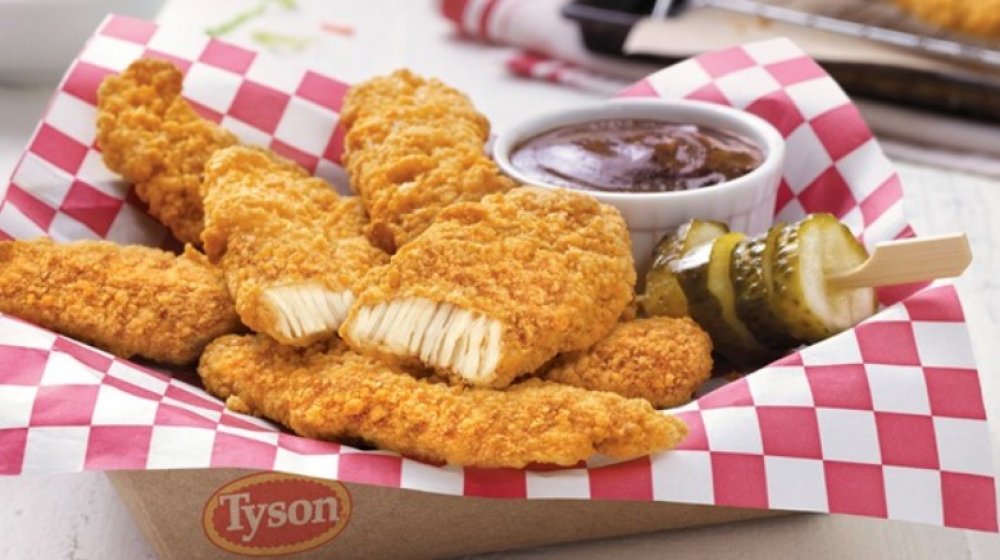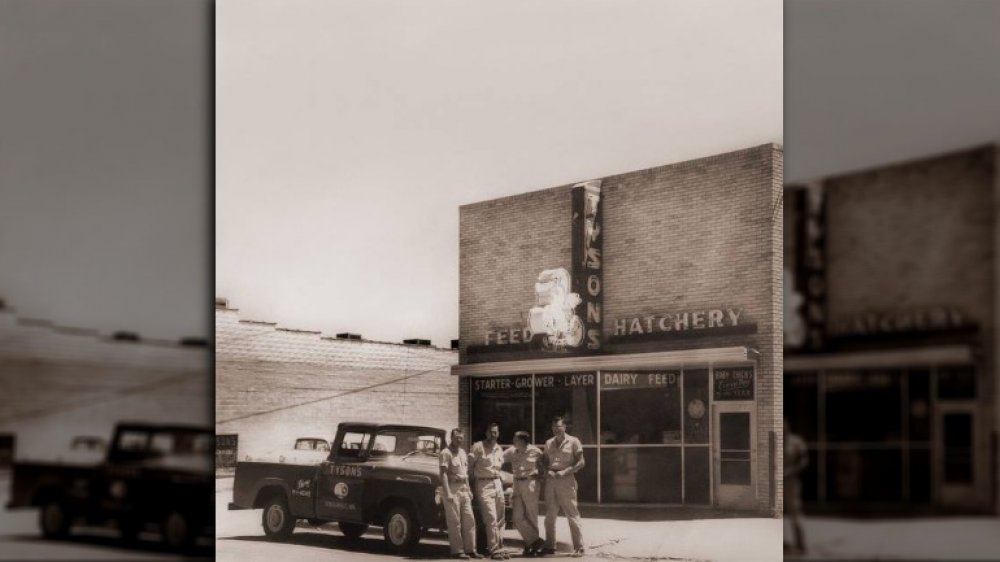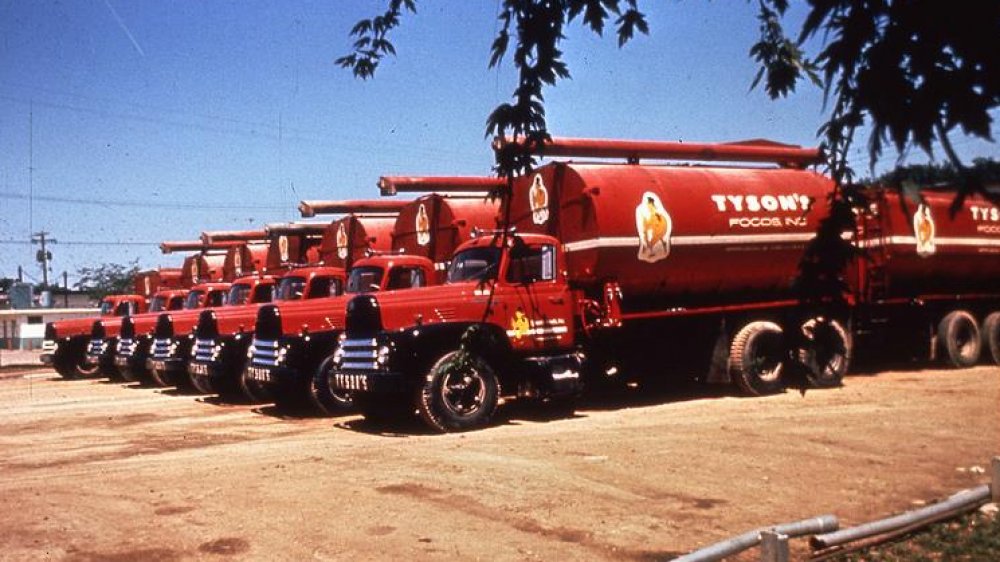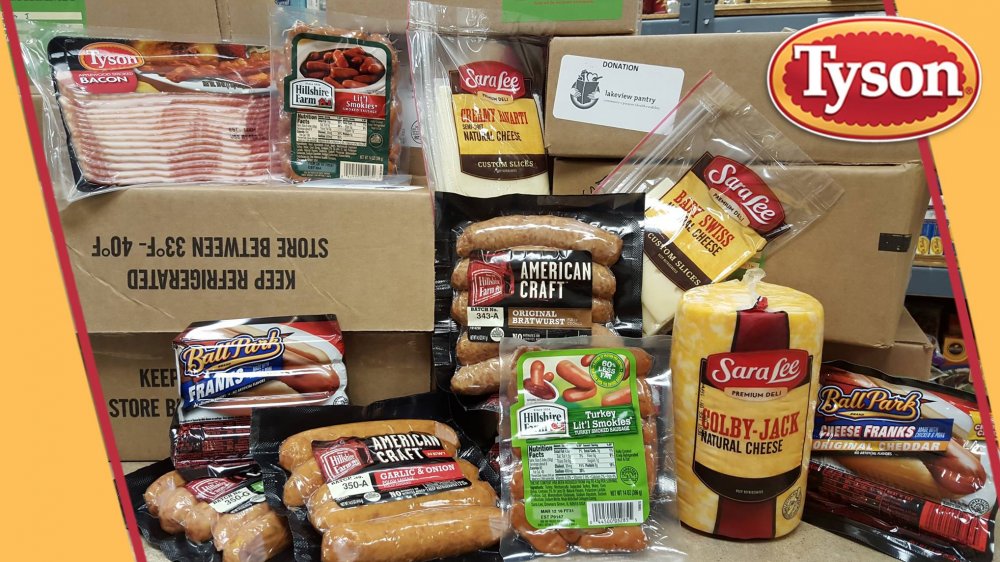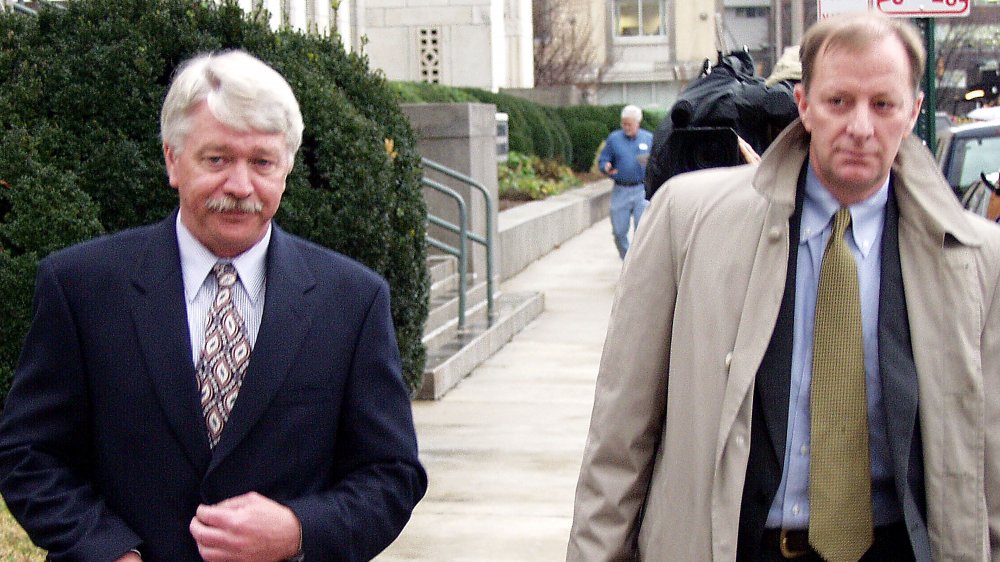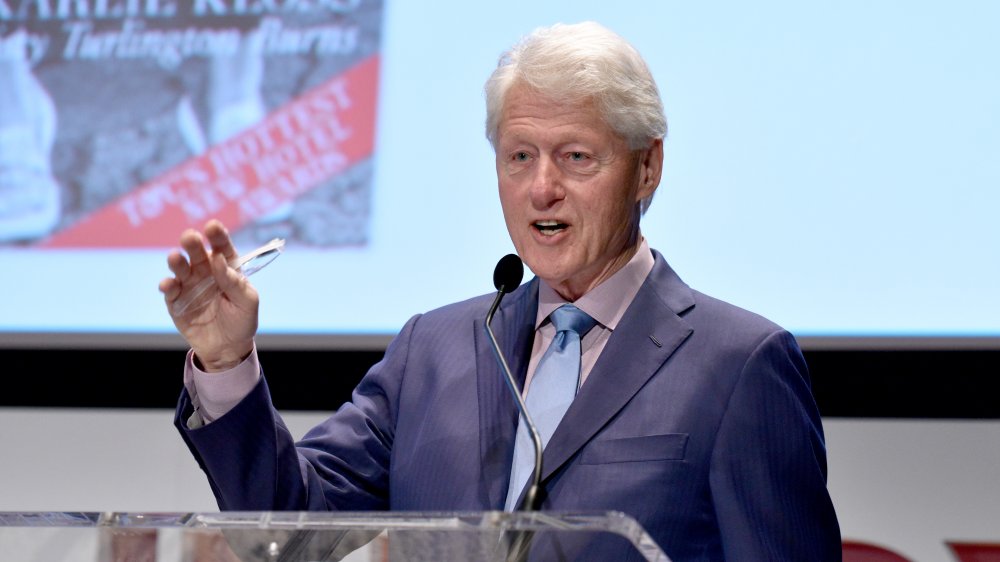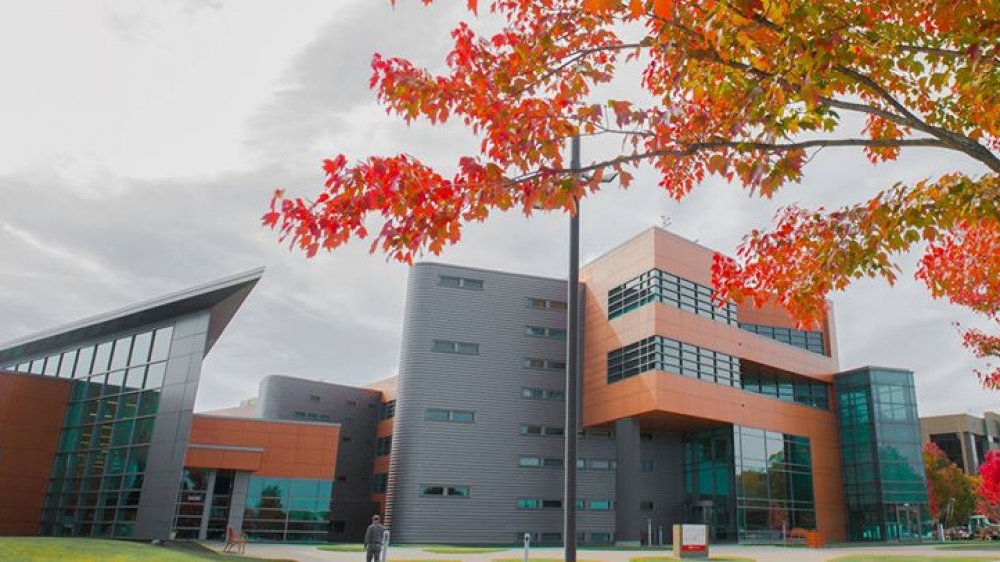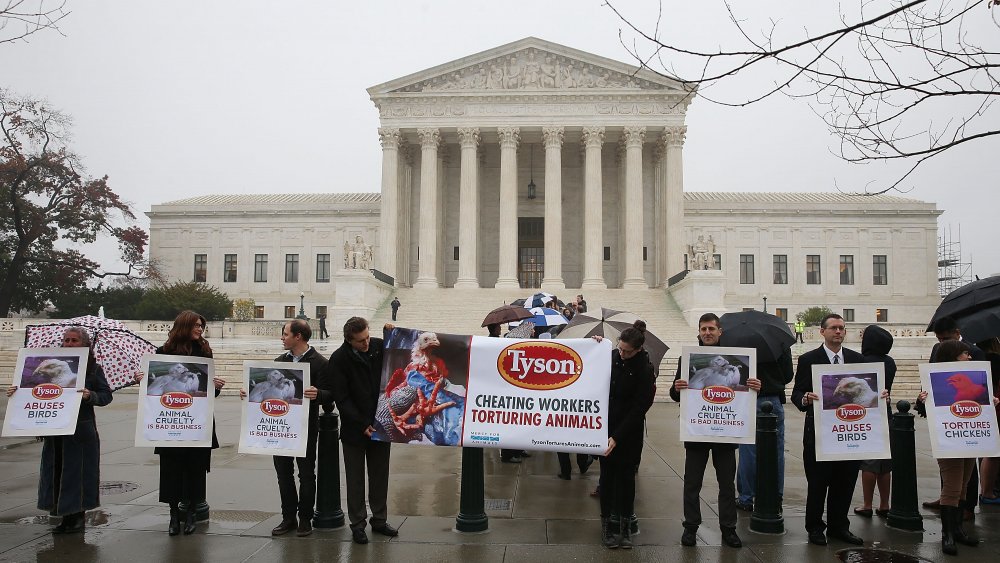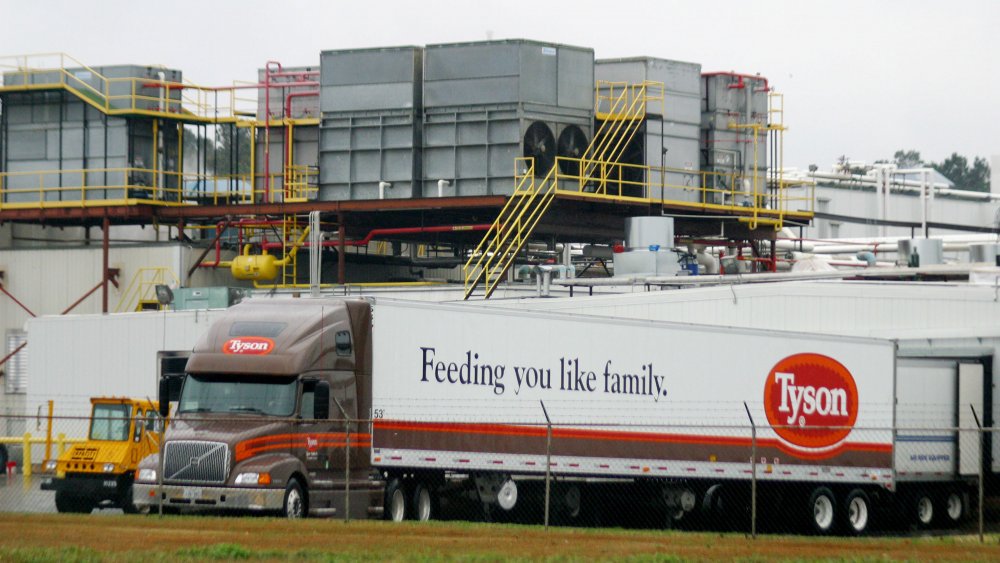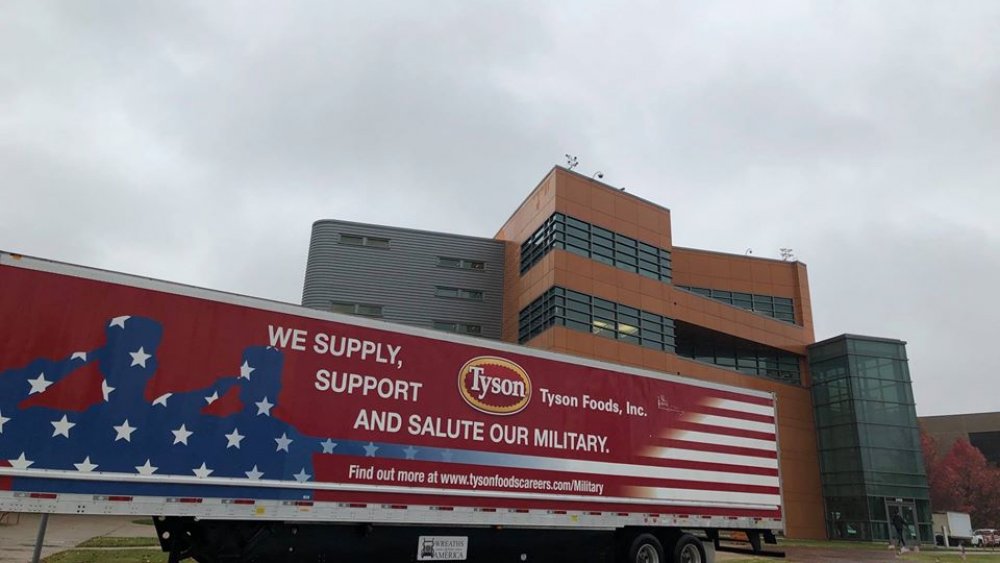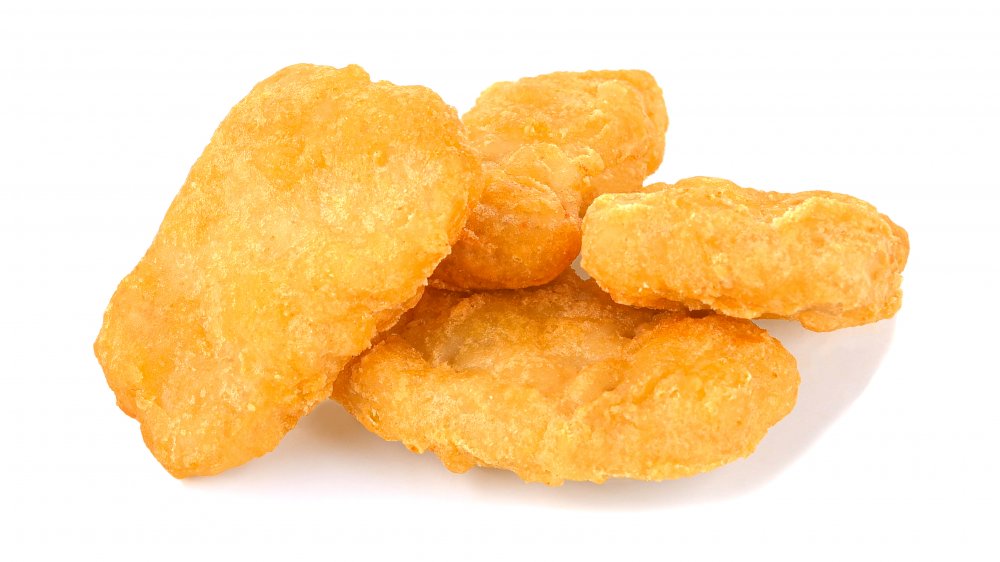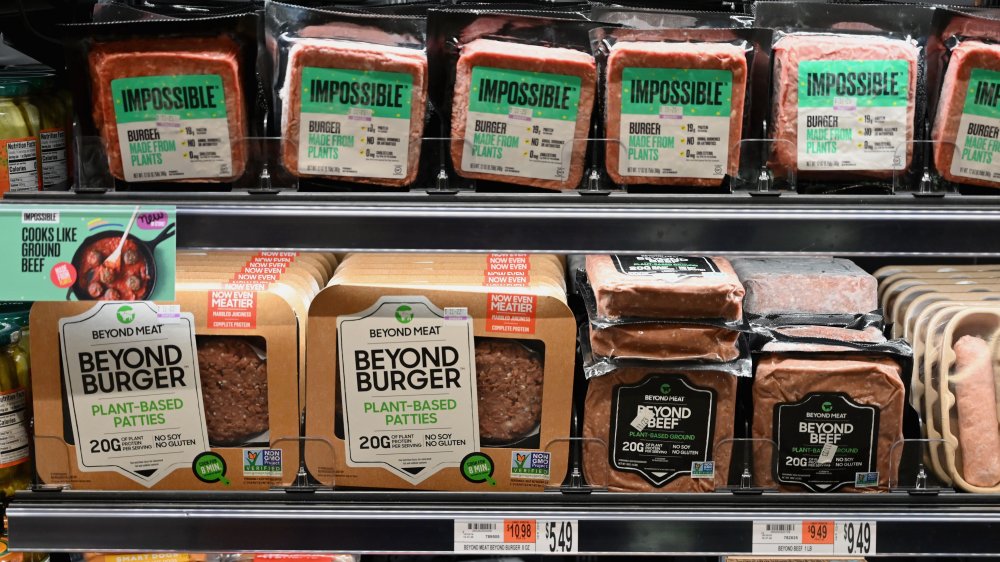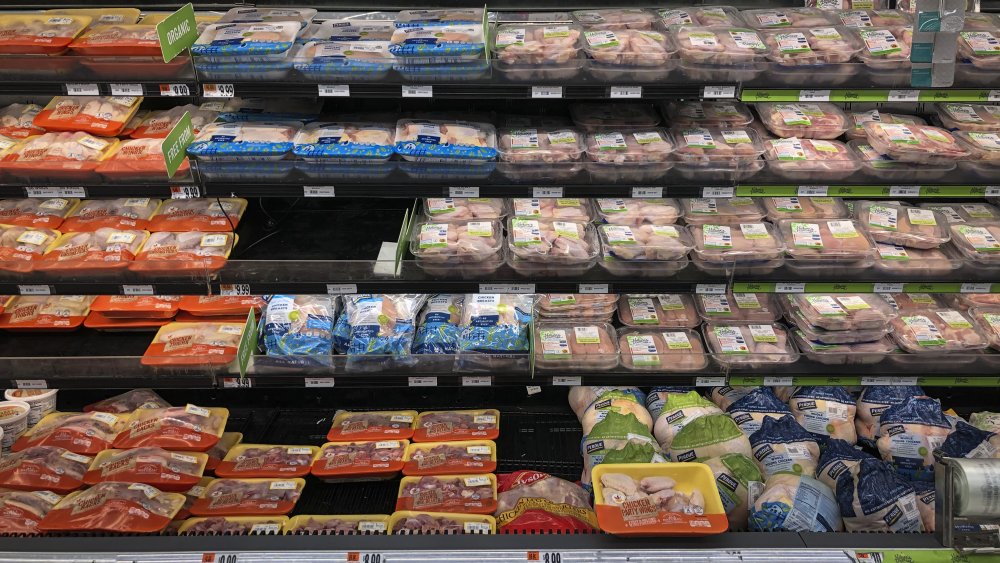The Untold Truth Of Tyson Foods
We may receive a commission on purchases made from links.
Tyson Foods is a brand that has become synonymous with grocery store chicken, especially of the frozen variety, but there's a lot more to company than chicken nuggets. In fact, the company probably has their hands on a lot more of your food than you think — even some of your favorite drive-through fare.
The company has a long history, full of brilliant innovation... but they've had their fair share of controversy, too. From meager beginnings as a family business to giant buyouts, political scandals, accusations of cruelty (to both animals and people), and presidential ties, there's a lot to learn about Tyson Foods.
They've been in the news recently due to dire warnings about the state of the country's meat supply chain, but we'll get to that later. First, we have to start from the beginning. This is the untold truth of Tyson Foods.
Tyson Foods started out as a small family business
Tyson Foods has been around a lot longer than you might think. It was founded in 1935 in Springdale, Arkansas by John Tyson who had moved to the city with his family four years prior during the Great Depression (via Tyson). In his first years there, he transported produce, animal feed, and chickens for local farmers. In 1935, Tyson borrowed initial capital and began delivering chickens from Springfield to Kansas City and St. Louis. He soon expanded to include Chicago and other cities in the Midwest like Cincinnati, Detroit, and Cleveland.
In the 1940s, Tyson got creative when a chicken shortage threatened his business. He started his own hatchery, and later added and commercial chicken feed business. During World War II, beef was rationed but chicken wasn't. This provided a boon for Tyson.
After the war, Don Tyson, John's son, joined the company at age 22 (via Encyclopedia). In 1967, Forbes says Don took over for his father, who was killed in a train accident.
Tyson Foods started buying companies a long time ago
In 1957, Tyson almost disappeared. According to Talk Business, they had a buyout offer from Swanson Foods. But instead of taking the easy way out and accepting that offer, they made the decision to decline, and grow on their own. In 1958, they built their own processing plant, and soon after going public, Tyson Foods began to buy up competitors in an effort to drastically increase their market share.
Tyson bought Prospect Farms in 1969, which later became the company's pre-cooked chicken division. In the 1970s the company changed their name to Tyson Foods, and acquired Ocoma Foods, Krispy Kitchens and the chicken division of Wilson Foods. During that same time period, they began introducing new chicken products, such as the breaded patty and chicken hot dogs and bologna. They were providing prepared chicken products for homes and restaurants, and getting bigger all the time. In 1978, Tyson Foods bought the rest of Wilson Foods
Tyson Foods continued acquiring companies through the 1980's. By 1989 the company had doubled in size and found itself to be the world's largest integrated producer, processor, and marketer of poultry-based products.
Tyson Foods deals in more than just chicken
In 1992, Tyson got into the seafood business when it reached an agreement with Oscar Mayer Foods to purchase the Louis Kemp Seafood Company (via UPI).
Kemp, a childhood friend of singer-songwriter Bob Dylan, expanded his company from a small fishing operation in the Great Lakes region to becoming the country's largest surimi (imitation crab) producer, a business move that Don Tyson must have admired. At the same time, the company announced that it was absorbing the Arctic Alaska Fisheries corporation.
This pivot into the seafood industry was part of a broader push for Tyson into different types of protein, which naturally expanded into the beef and pork market. Tyson initially made its move in to the pork business in 1970s with the purchase of a pig farm in North Carolina. They acquired more and more meat companies of all kinds until the corporation became the world's largest processor and marketer of the three main meat varieties: chicken, beef, and pork.
Many people associate the Tyson brand solely with chicken, but their product line spans from bacon to seasoned steak tips to smoked pork chops (via Tyson). The company also owns other major food brands, many of which are meat-focused such as Jimmy Dean, Hillshire Farm, and Ball Park (via Tyson). Today, they also own other brands you may know, such as Sara Lee, State Fair, Bosco's, Corn King, and Original Philly.
Tyson Foods has had it's share of legal troubles
It wasn't all smooth sailing for Tyson Foods. In 1998, the company accepted a legal settlement and agreed to pay $6 million to the federal government in penalties for its alleged influence-buying.
Here's what happened. Rules and regulations overseeing the meat industry are determined by the Department of Agriculture. Tyson Foods was charged with trying to "buy off" then Secretary of Agriculture Mike Espy with gifts including airplane tickets, tickets for an NFL game, and a scholarship. During the time frame those gifts were given, the USDA was considering adding new labeling restrictions that would have meant millions in new costs for Tyson.
While Tyson's side of the case was settled before it went to trial, a federal jury acquitted Espy of more 30 counts during his trial in 1998 (via The New York Times). His lawyers argued that the gifts were the result of long-standing relationships and not bribes.
Tyson Foods has ties to the Clintons
Tyson Food's rise to corporate greatness in Arkansas happened during the same time Bill Clinton served five terms as governor of the state, and some say both achieved what they did thanks to the other.
Tyson received $7.8 million in tax breaks to expand existing plants (via The Washington Post) between 1988 and 1990, while Clinton was governor. Pine Bluff, Arkansas, also received a $900,000 grant to build roads and develop the city's infrastructure when Tyson was considering the location for a $40 million new processing plant.
Tyson has said the grant — and the subsequent tax breaks they received — had nothing to do with their choice of location. Clinton has said he was just trying to expand the workforce in a state that was experiencing high unemployment rates.
On the other end of this "I scratch your back you scratch mine" model, Tyson provided nearly a dozen free airplane rides to the governor and his wife, and aided immensely in fundraising for Clinton's gubernatorial reelection campaigns, and ultimately his run for president. This was all good and well for the two involved parties, but the chummy relationship did not please many Arkansans who felt they weren't factored into the equation.
Once Clinton won the White House, accusations of corruption continued. Around the time of the Espy scandal, Tyson told reporters, "I am quickly growing weary of the insinuations and allegations that the company bearing my family name is in some insidious way benefiting as a result of the fact that the former governor of Arkansas now resides at 1600 Pennsylvania Ave. in Washington" (via The Los Angeles Times).
Tyson Foods cause problems for the water in Arkansas
Raising and processing chicken creates a lot of waste, and it's created a lot of trouble for Tyson Foods — and the states where they reside.
Around the 1970s, The Washington Post says waste from the Tyson's Green Forest Plant in Arkansas began overflowing from the town's treatment system and running into a nearby creek. After failure on both the state and Tyson's parts to successfully intervene, the problem only got worse. A sinkhole developed in the overloaded creek, and sewage started seeping into the ground water. However, "seeping" may be a generous term. An estimated million gallons of water every day got mixed up with the water supply, which caused many in the town to develop dysentery and salmonella. Some 17 months later, Governor Clinton declared a state of emergency. Most of the affected residents eventually were put on a city water line, but the dumping of waste continued in the area.
The troubles of Tyson fouling up Arkansas' water supply didn't end there. In the early 1990's, almost 300 miles of streams were so polluted by animal waste that they were closed for swimming. The waste produced by the chickens in Northwest Arkansas where Tyson was based amounted to 500,000 tons, as much as would be created by four million people. At the time an environmental lawyer warned that the state was "in the process of losing [its] surface waters in northwest Arkansas because of the poultry industry, and [Clinton] hasn't said what [he was] going to do to clean it up."
Tyson Food's treatment of animals has caused controversy
While much of the company's history has been characterized by periods of immense growth and profit, Tyson has also seen its fair share of criticism, much of which has to do with its treatment of animals.
In 2015, Tyson cut ties with a farm in Tennessee where workers were caught on undercover video stomping, clubbing, and stabbing chickens (via Business Insider). In response to the video, Tyson spokesperson Worth Sparkman said, "Animal well-being is a priority at our company and we will not tolerate the unacceptable animal treatment shown in this video... Members of our animal-well being team are investigating, however, based on what we currently know, we are terminating the farmer's contract to grow chickens for us."
However, this response wasn't enough for the non-profit which filmed the undercover video. The president of Mercy for Animals told a news conference that it was "too little too late" given the fact that Tyson had awarded the farm "Grower of the Year' for the previous five years in a row.
Just two years later in 2017, an animal rights group called Compassion Over Killing released undercover footage of chickens being subjected to horrific abuse at a Tyson supplier, Atlantic Farm in Temperanceville, Virginia. According to The Washington Post, the animals were kicked, stomped, and impaled by employees at the farm. Tyson also terminated it's relationship to that farm.
There's also been controversy over Tyson's treatment of employees
Criticism of Tyson has extended to its treatment of its employees as well, and some of the accusations lodged against them are baffling.
In 2016, an Oxfam report found that employees at Tyson (as well as at other poultry companies such as Pilgrim's and Perdue) were forced to wear diapers because they were denied bathroom breaks by the company (via UPI). The report read, "Workers struggle to cope with this denial of a basic human need. They urinate and defecate while standing on the line; they wear diapers to work; they restrict intake of liquids and fluids to dangerous degrees; they endure pain and discomfort while they worry about their health and job security."
The company is also famously anti-union and has had to deal with employee strikes and walkouts at a number of its processing plants including locations in Pasco, Washington, and Jefferson, Wisconsin. Tyson decided to close the Jefferson plant in 2016, and though the decision was made some ten years after the strike, some say it may have left a bad taste in Tyson's mouth (via Daily Union).
Tyson got a hefty fine from the EPA
Tyson Foods has also run afoul of the Environmental Protection Agency on a number of occasions, and their crimes against the environment aren't limited to Arkansas.
Most recently, in 2018, the Tyson Poultry division of the company was fined $2 million for its violations of the Clean Water Act with an additional $500,000 charge to remedy harm. (via United States Department of Justice) The violations occurred years earlier in 2014, when a liquid food supplement that was used in a Tyson facility leaked out of a storage facility in Aurora, Missouri.
Tyson transported the leaked supplement to the city of Monnet, Missouri where it was dumped into the sewers. The food supplement was extremely acidic and when it made its way to the city's water treatment system, it killed the bacteria used to reduce the amount of ammonia in the water. As a result the water that exited the water treatment plant had higher levels of ammonia than can be considered safe, and the death of 108,000 fish resulted.
Tyson Foods has a connection to McDonald's
Believe it or not, Tyson Foods even has a hand in some of the foods you're served from McDonald's.
In 2018, Tyson purchased Keystone Foods, the maker of McDonald's Chicken McNuggets, for $2.5 billion (via Investor's Business Daily). Due to unfavorable market conditions, the deal closed for well under the $3 billion expected for the acquisition.
The deal was Tyson's second-largest acquisition after its purchase of AdvancePierre Foods for $4.2 billion the year prior. In addition to the lucrative chicken nugget contract, the deal netted Tyson six processing plants and an innovation center in the United States as well as eight plants and three innovation centers around the world. The move was part of a larger push by Tyson to divest in some of its non-meat products and focus more on protein. For example, it sold a pizza crust bakery and Sara Lee Frozen Bakery the same year, and around the same time it purchased Keystone, it also bought out Tecumseh Poultry, an organic chicken producer (via Adage).
Tyson Foods has invested in plant-based meat
Between 2016 and 2017, Tyson invested $34 million in Beyond Meat, the alternative protein company which has brought a range of plant-based sausage, burger, and other meat products onto grocery store shelves (via CNBC). The $34 million invested amounted to a 6.5 percent ownership stake in the fledgling company.
In 2019, Tyson announced that it had sold its stake in Beyond Meat because the company planned to launch its own brand of alternative protein foods. Estimates suggest that the investment had more than doubled in value and would have been worth around $79 million when it was sold just a few years later (via Reuters).
Just months after the sale of its investment in April, Tyson announced the unveiling of its own line of alternative protein products including plant-based and plant-meat-blended meatballs, nuggets, and sausages expected to directly compete with Beyond Meat (via Tyson).
Market research suggests that the global alternative meat industry will achieve $100 billion in sales by the year 2030 (via Marketwatch). This figure is an increase compared to an estimate of $19 billion in 2018. Current estimates of the alternative meat market place its value at around $2.5 billion. Compared to the global meat market which is worth $1.4 trillion, the alternative protein scene may seem like small potatoes, but given its rapid growth in popularity and market share in recent years, Tyson's involvement in the industry is yet another instance of it being ahead of the business curve.
Tyson Foods warned of a meat shortage
In April 2019, Tyson Foods warned that "the food supply chain is breaking" as they closed their plants around the country as a result of the coronavirus pandemic (via CNN).
The company warned that "millions of pounds of meat" would disappear from grocery stores and consumers may experience a meat shortage around the country until they could reopen their processing facilities. The message was published in the form of a full-page ad which appeared in The New York Times, The Washington Post, and The Arkansas Democrat-Gazette. Tyson suspended production at several pork processing plants in response to coronavirus outbreaks among employees. In addition to the Tyson closures, Smithfield Foods in Sioux Falls, South Dakota, and JBS pork processing in Worthington, Minnesota, also closed as a result of the virus. Together, these plants represent 15 percent of the country's pork production.
On April 28, President Donald Trump said that he was working with Tyson Foods, and would sign an executive order invoking the Defense Production Act, which would classify meat production as "critical infrastructure" in an attempt to keep meat processing plants open and grocery store shelves stocked (via Marketwatch).
